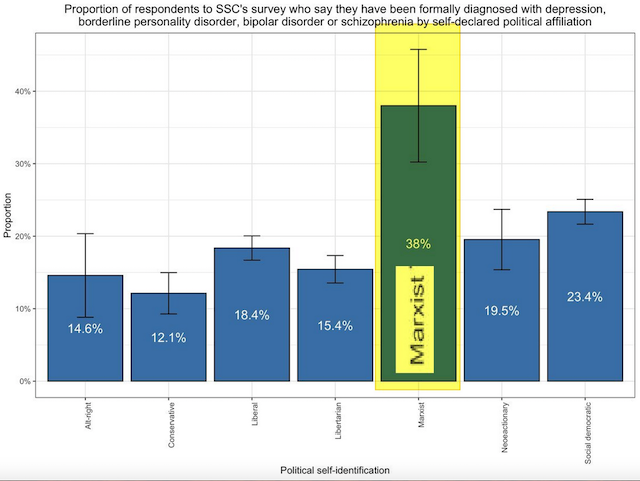 Liberalism Is a Mental Disorder isn’t just a book by radio host Michael Savage, it turns out. It’s also a reality, according to a new survey showing that people identifying as left-wing are more likely than other ideologists to have been diagnosed with mental illness.
Liberalism Is a Mental Disorder isn’t just a book by radio host Michael Savage, it turns out. It’s also a reality, according to a new survey showing that people identifying as left-wing are more likely than other ideologists to have been diagnosed with mental illness.
Conducted by science blog Slate Star Codex and involving 8,000 respondents, the “results show that people who occupy the farther left end of the political spectrum are more likely to have been ‘formally diagnosed with depression, borderline personality disorder, bipolar disorder, or schizophrenia,’” reports Summit News.
“In addition, the results show that the highest percentage of respondents (38%) who admit being diagnosed with forms of mental illness also identify politically as Marxists,” Summit continues. “In comparison, just 12.1% of conservatives say they have been diagnosed with a mental disorder”

This just accords with previous findings, WND.com reminds us. For example, in “an extensive series of surveys involving more than 4,000 interviews conducted over the course of four years, Gallup pollsters in 2007 reported that Republicans had ‘significantly’ better mental health than Democrats, with Independents ranking in-between the two parties,” the site relates.
“‘One could be quick to assume,’ said Gallup’s analysis, ‘that these differences [in mental health] are based on the underlying demographic and socioeconomic patterns related to party identification in America today,’ noting that ‘men, those with higher incomes, those with higher education levels, and whites are more likely than others to report excellent mental health. Some of these patterns describe characteristics of Republicans, of course,’” WND also tells us. (Note that, today, Democrats actually have higher incomes.)
“However, Gallup revealed, ‘an analysis of the relationship between party identification and self-reported excellent mental health within various categories of age, gender, church attendance, income, education, and other variables shows that the basic pattern persists regardless of these characteristics,’” WND continued. “‘In other words, party identification appears to have an independent effect on mental health even when each of these is controlled for.’”
Moreover, “a 2013 SurveyMonkey study commissioned by left-leaning website BuzzFeed News found that Democrats suffered mental illness notably more than Republicans in almost every category,” WND further informs.
There also was a 2004 study that analyzed the voting preferences of mentally ill outpatients in Mannheim, Germany, finding that 78 percent of them preferred left-wing parties; only 56 percent did among the city’s general population.
Even more striking, a 2007 analysis of General Social Survey (a major study) data found that while only 6.2 percent of people in the “conservative” category suffered from a “mental illness,” 17.9 percent of those in the “liberal” category did.
Of course, critics claim that other factors explain this disparity, such as the “mentally ill” possibly believing that liberal politicians serve their needs via government, and leftists being more likely to trust the psychiatric profession and get diagnosed and to analyze their problems through a psychological lens in the first place. While these attitudes do likely make a difference, though, there’s more to it.
I’ve long observed an association between liberal politics and what’s commonly known as “mental illness,” at least as far back as when I used to work with children decades ago. Yet while it’s no surprise that the seriously disturbed would gravitate toward leftist ideology, there’s a little understood factor: What’s called “leftism” is actually not an ideology but a process of entropic change, of moral decay — and many of what we call “mental disorders” (not all, of course) are actually a result of moral dysfunction.
Common-sense psychologist John Rosemond alluded to this years ago, lamenting (for instance) that while generations ago people viewed childhood misbehavior as a moral problem, now they too often consider it a psychological problem. (This mentality’s general application is why most everything formerly considered a sin is now diagnosed as a disease or condition of the brain.) Examples are “Oppositional Defiant Disorder” and “Sibling Rivalry Disorder.”
One Rosemond addressed is “Attention Deficit Hyperactivity Disorder” (ADHD). He explained that this is really just a result of a dysfunctional but now common modern parenting model and that all children have “ADHD” (if we’re to thus frame it) up until age two, but the (mis)behavior pattern is purged from them if they’re correctly socialized.
My experience with children bore this out. Every kid I encountered who’d been “ADHD” diagnosed (back then it was just “ADD”) came from a liberal home. In contrast, the best-behaved children generally had three commonalities: politically conservative parents; a church life active to some degree; and a stay-at-home mother — or at least one usually home when the child is (these factors correlate, of course).
Moreover, the “ADHD” kids didn’t exhibit any of their “symptoms” when in my charge because I enforced discipline; they knew misbehavior brought consequences. So unless someone believes the children could somehow decide to not be “sick” when in my proximity, it’s clear what was going on.
Even some liberals understand this. Just consider the case of a 12-year-old boy whose Democrat family I’d known somewhat, having been to their house for social reasons. One day his mother and I were discussing his “ADHD” and I finally asked, “Marianne [not her real name], where do you think all this comes from?” To her credit she confessed plaintively, “Look, I know it all begins at home.”
Saying that leftism is movement toward moral disorder is not mere opinion because, contrary, to risible relativist bunkum, morality is not mere opinion. Its elements were long ago defined and are known as “virtues,” with examples being charity, chastity, courage, diligence, kindness, faith, hope, honesty, fortitude, justice, temperance, prudence, patience, forgiveness, humility, and love.
Furthermore, it’s hard to think of many virtues not under either direct or indirect attack by the Left. A prime example is the Sexual Devolution’s assault on chastity; and then, of course, there’s how liberals’ characteristic moral relativism denies that virtues (elements of absolute good) can even exist.
Yet anyone denying morality is denying himself — happiness. Greek philosopher Aristotle observed millennia ago that living a moral life is a prerequisite for happiness. Related to this, research shows that religious practice is associated with higher levels of well-being and happiness and better mental health. What’s the relevant connection here?
Religion involves moral teaching and rejection of the “If it feels good, do it” credo — and conservatives are generally more religious than are leftists.
All this said, keenly observing our political sphere tells us more than any study not only who doesn’t have any solutions — but also who has most of the problems.
Written by Selwyn Duke for the New American ~ February 14, 2020

